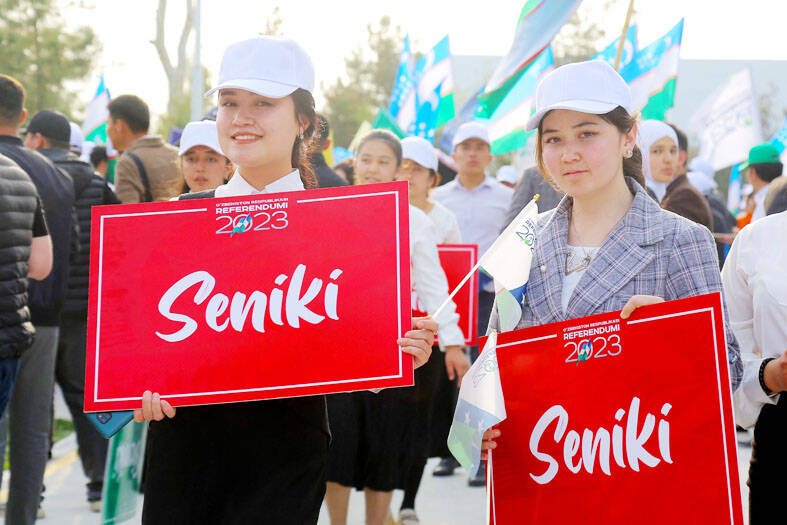On stage in front of a few hundred people, an entertainer desperately tries to sell a controversial referendum that could extend the rule of Uzbekistan’s autocratic leader until 2040.
The April 30 vote is on a constitutional amendment that would introduce seven-year presidential terms and allow Uzbek President Shavkat Mirziyoyev to run for two new terms.
This would allow Mirziyoyev, in power since 2016, to potentially rule for two more decades.

Photo: AFP
“Will you come to vote?” the entertainer asks the predominantly young crowd.
Few doubt the outcome of the referendum, billed as ushering in an “era of development.”
Some of the students at the event in Jizzakh in central Uzbekistan said their professors forced them to go and even provided them with flags, banners and caps.
Anyone attempting to leave the two-hour rally was promptly told to “turn back.”
“The constitution is yours, mine, ours,” and “Yes, we’ll come vote,” the students sing.
The government has spared no resources, and called up singers and athletes to beat the general apathy.
The crowd was treated to a free concert by Gulsanam Mamazoitova, a singer with more than one million followers on Instagram.
People in the Central Asian nation “need to support the president and this constitution,” said Nigora, a student in the audience who declined to give her full name.
“For me, this referendum is very important,” Nigora said.
Oibek Alizhonov, a 45-year-old entrepreneur, said he supported Mirziyoyev’s policies “200 percent” and “sees no other leader.”
However, “the length of the presidential mandate should not be changed,” Saera Yakhshilokova said. “No one should be in power well into old age. Presidents should be changed through elections.”
Mirziyoyev introduced some reforms after decades of dictatorial rule under former Uzbek president Islam Karimov, but he is still criticized for his rights record.
His constitutional reforms started with bloodshed.
In July last year, 21 people died in protests over changes that would have undermined self-determination in the Republic of Karakalpakstan, and forced a rare U-turn by Mirziyoyev.
“I like some amendments on the judicial system, but I do not agree with the extension of the presidential mandate,” said Azimzhon Okmurodov, a student.
“In the end, there will just end up being the one person ruling the country for a long time,” he said.

Malaysia yesterday installed a motorcycle-riding billionaire sultan as its new king in lavish ceremonies for a post seen as a ballast in times of political crises. The coronation ceremony for Malaysia’s King Sultan Ibrahim, 65, at the National Palace in Kuala Lumpur followed his oath-taking in January as the country’s 17th monarch. Malaysia is a constitutional monarchy, with a unique arrangement that sees the throne change hands every five years between the rulers of nine Malaysian states headed by centuries-old Islamic royalty. While chiefly ceremonial, the position of king has in the past few years played an increasingly important role. Royal intervention was

X-37B COMPARISON: China’s spaceplane is most likely testing technology, much like US’ vehicle, said Victoria Samson, an official at the Secure World Foundation China’s shadowy, uncrewed reusable spacecraft, which launches atop a rocket booster and lands at a secretive military airfield, is most likely testing technology, but could also be used for manipulating or retrieving satellites, experts said. The spacecraft, on its third mission, was last month observed releasing an object, moving several kilometers away and then maneuvering back to within a few hundred meters of it. “It’s obvious that it has a military application, including, for example, closely inspecting objects of the enemy or disabling them, but it also has non-military applications,” said Marco Langbroek, a lecturer in optical space situational awareness at Delft

The Philippine Air Force must ramp up pilot training if it is to buy 20 or more multirole fighter jets as it modernizes and expands joint operations with its navy, a commander said yesterday. A day earlier US National Security Adviser Jake Sullivan said that the US “will do what is necessary” to see that the Philippines is able to resupply a ship on the Second Thomas Shoal (Renai Shoal, 仁愛暗沙) that Manila uses to reinforce its claims to the atoll. Sullivan said the US would prefer that the Philippines conducts the resupplies of the small crew on the warship Sierra Madre,

AIRLINES RECOVERING: Two-thirds of the flights canceled on Saturday due to the faulty CrowdStrike update that hit 8.5 million devices worldwide occurred in the US As the world continues to recover from massive business and travel disruptions caused by a faulty software update from cybersecurity firm CrowdStrike, malicious actors are trying to exploit the situation for their own gain. Government cybersecurity agencies across the globe and CrowdStrike CEO George Kurtz are warning businesses and individuals around the world about new phishing schemes that involve malicious actors posing as CrowdStrike employees or other tech specialists offering to assist those recovering from the outage. “We know that adversaries and bad actors will try to exploit events like this,” Kurtz said in a statement. “I encourage everyone to remain vigilant